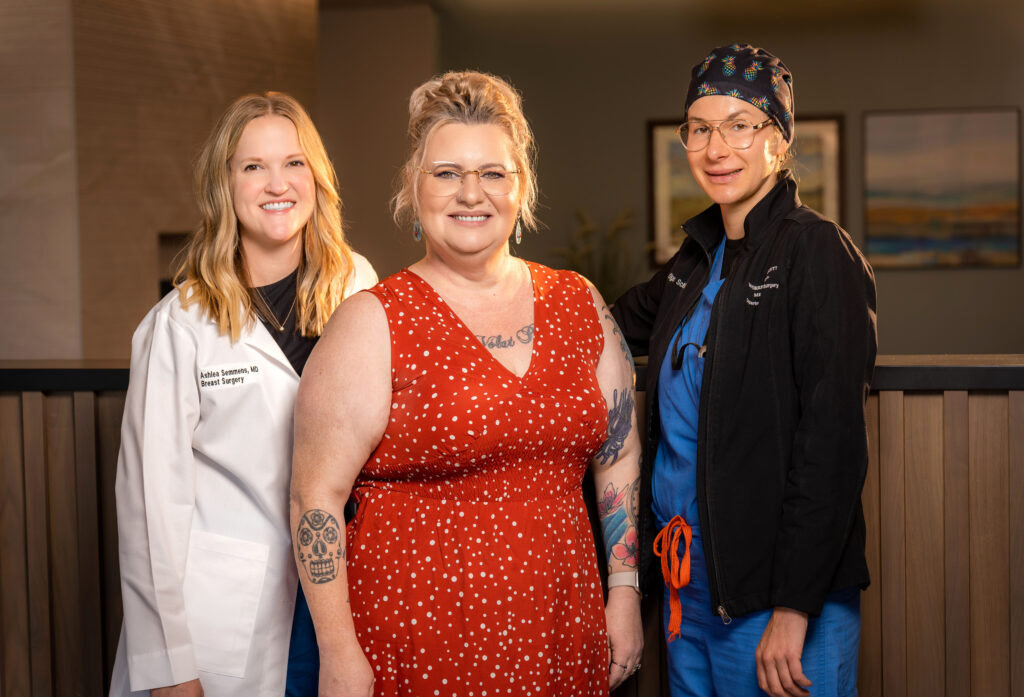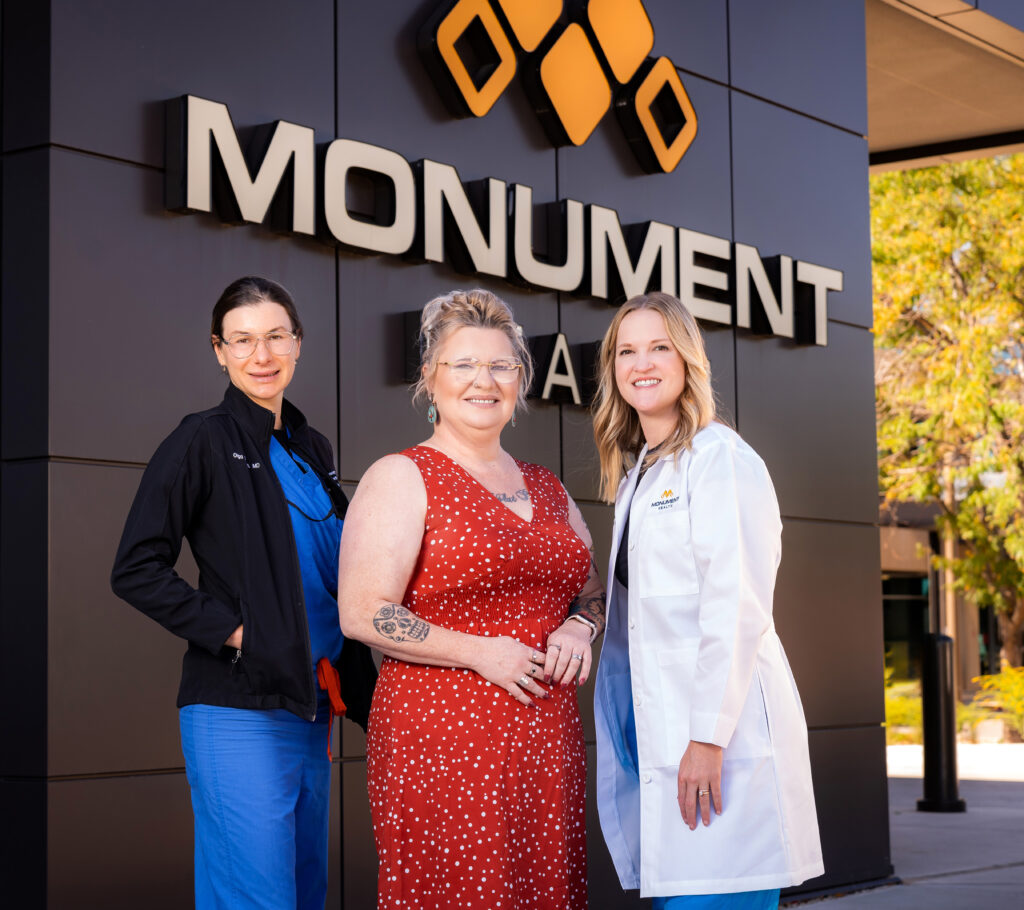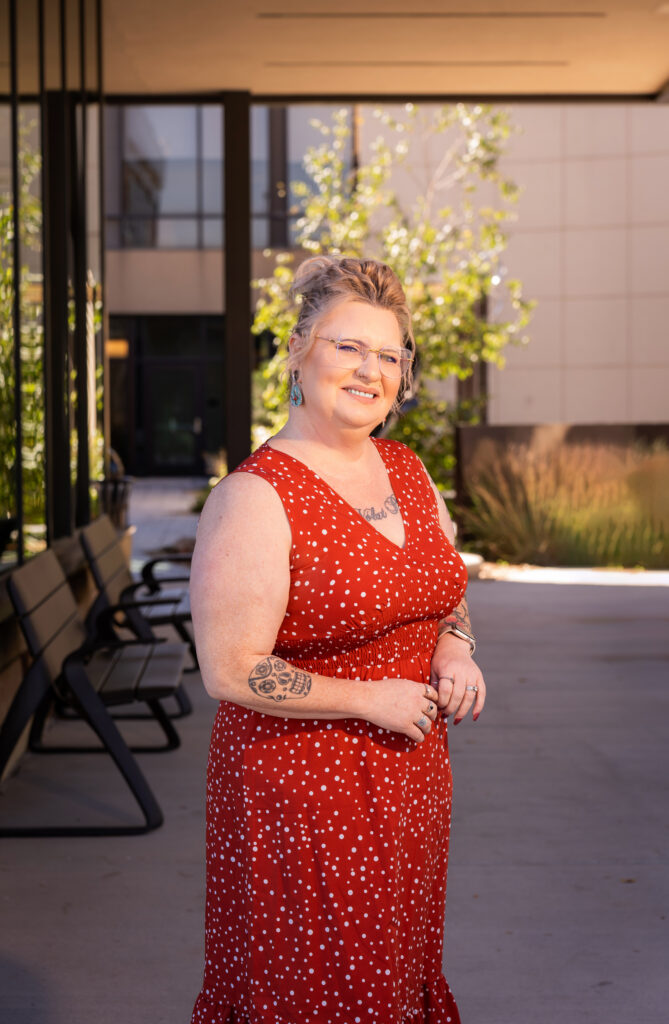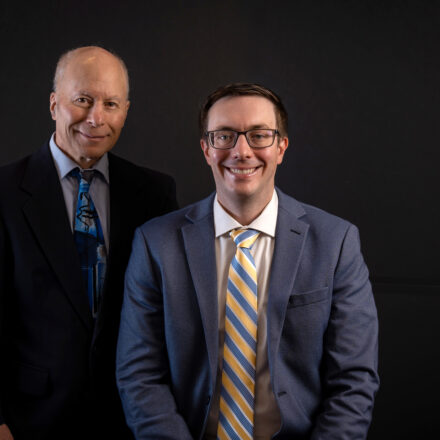
Ashlea Semmens, M.D., Brenda Sensanbaugher and Olga Schuth, M.D.
Even before she was diagnosed with breast cancer, Brenda Sensanbaugher, 44, was already armed for the cancer fight. After all, she’d been through it before.
Three times.
It was in 2009 when Brenda, then 29, was first diagnosed with early cervical cancer. “I ended up having to have a complete hysterectomy,” she says. Then, in 2014 after the discovery of a neoplasm on her pancreas, she was diagnosed with a malignant pancreatic neuroendocrine tumor, which required a pancreaticoduodenectomy and the removal of her gallbladder. During this process, it was also discovered that she had basal cell carcinoma on her forehead, which was also treated.
When her yearly mammogram appointment came around this past spring, it is perhaps unsurprising that Brenda was hesitant to follow through because she was “sick of cancer crap.” Luckily, she kept the appointment, and found out that some previously-known abnormalities required further investigation. “It was actually Easter weekend, and I received a phone call from my primary doctor telling me that I had ductal carcinoma, and I would need surgery, and possibly plastic surgery.”
Thus began her fourth struggle against cancer.

Olga Schuth, M.D., Brenda Sensanbaugher and Ashlea Semmens, M.D.
She was treated by Breast Care Program Director Ashlea Semmens, M.D. at Rapid City Hospital. “From the minute I got to see her, she was just so informative and so caring,” says Brenda. “I just remember her putting me at ease a lot, and then she set me up right away – I mean, like within the same week – with plastics, and I ended up getting to see a plastic surgeon, Dr. Olga Schuth.”
Brenda needed a partial mastectomy with a complete oncoplastic reconstruction. She had surgery in April and by late spring was recovered enough to undergo plastic reconstruction.
“My surgeons did an amazing job. They made sure that when I walked out of there, not only was I cancer free, God willing, but they also made sure that I walked away looking the best as I possibly could.”
Brenda was also under the care of Daniel Petereit, M.D., FASTRO, at the Cancer Care Institute, who said she would need 15 rounds of radiation treatment to minimize chances of recurrence. Radiation began this past summer, right after Independence Day. “We hit it hard. We did five days a week for three weeks. I completed that on July 26,” she says.
“Before I started radiation, I went searching on Instagram. I was typing in ‘breast cancer,’ ‘breast radiation,’ using all the hashtags I possibly could. Believe it or not, there wasn’t that much on there with real life women, per se. I wanted to know, is it as scary as I’m thinking it’s gonna be? And so I decided that every day I went to radiation, I was going to take a new picture.”

Brenda documented the radiation saga of her fourth overall battle with cancer for the 770+ followers of her instagram account, @dakotamountaingirl. “With all my other cancers, I was very private about it. Breast cancer is so prevalent, it tends to be something that opens peoples’ eyes. And I decided to use my new platform to bring attention because that’s what I needed to read. I wanted to see something that was comparable to myself. And so I decided if I can help one person like myself that needed to see that – that’s what my goal was.”
In that same spirit of awareness, Brenda has emphasized to her two adult daughters the importance of getting exams, especially because their late father was uncertain about his family tree. “If you are a carrier of this, there are options available that hopefully would limit you having any chance of going through this. You don’t wish it on anybody, especially your children.” Her daughters each have upcoming appointments for genetic testing.
To other women experiencing fear or having reservations about getting exams, Brenda shares this message of hope: “If you focus on the positive, you have something to move towards. If we live in the negative, we bring the negative to us and it tends to make things worse,” she says. “Listen to your body. Have the tests. Talk to your providers and don’t stop until you have an answer about what’s going on.”
Story: Kory Lanphear
Photos: Robert Slocum
Category
Blog PostsLatest News
More Like This

